Over the years, I’ve become known as the guy who debunks fitness dogma and nonsense. Despite all appearances, I do not set out to find people to debunk or call out. I don’t enjoy it that much. Typically, the return on investment yields quite a bit of hate and nasty comments. That said, I feel it’s essential to call out misinformation when it occurs because it always harms people, no matter how noble the INTENTIONS are. When I say ‘misinformation,’ I’m not talking about a difference of opinion. I’m not talking about differences in preference based on a few cherry-picked studies. When I say ‘misinformation,’ I mean information that directly contradicts the overwhelming body of evidence and then being packaged and sold as truth. As I said, this isn’t what I go out looking for. But because of my reputation, people end up sending me tons of fitness content and asking for my opinion on the information itself along with any claims. More often than not, the content ends up being garbage because this is the fitness industry. And the industry is filled with vile, repugnant charlatans who are willing to make any claim so long as it makes them money and builds their following.
Dr. Jason Fung is someone who has repeatedly gotten on my radar over the last five years. His mountains of false, fallacious, and otherwise ridiculous claims have resulted in me attempting to engage him in a debate along with creating various posts and videos to address his claims. As of now, all attempts at a formal debate have been unsuccessful as he hasn’t acknowledged them.
So who is Dr. Jason Fung? He is a Canadian Nephrologist (Kidney doctor) whose website says he is “a world-leading expert on intermittent fasting and low carb, especially for treating people with Type 2 Diabetes.” He originally came into notoriety after writing The Obesity Code and has since written The Diabetes Code and The Cancer Code. This article won’t be a debunking of those books. While the books sold very well, they certainly have not been embraced by academics and experts. Most of them have roundly slammed Dr. Fung’s books, including Red Pen Reviews which gave The Obesity Code a shocking score of 31% for ‘Scientific Accuracy.’ [1][2][3] For context, Red Pen Reviews was founded by Seth Yoder and Dr. Stephan Guyenet to provide systematic reviews of nutrition books and the veracity of their claims. All of their reviews are transparent and open to the public so they can see their process. The book reviews are all done by a primary reviewer and a secondary reviewer, all of whom have at least a master’s degree or higher (several of them also conduct reviews for scientific journals). They are the best source of unbiased reviews of nutrition books available today.
In addition to his erroneous claims, Dr. Fung’s reluctance to debate bothers me. The only evidence I could find of him debating anyone was on a TV show called The Doctors, where he engaged in a short debate with vegan Dr. Joel Kahn, someone who happens to fall on the other end of the same coin as Dr. Fung. They aren’t evidence-based, and they just happen to have diametrically opposing diets for which they advocate. [4][5][6] Other than that, I could not find where he has debated a nutrition expert. As stated, my numerous calls for debate have gone unanswered. [7][8] Here is the debate on The Doctors: https://www.thedoctorstv.com/articles/great-ketogenic-diet-debate.
Dr. Fung ignoring the calls to defend his claims would not bother me so much if he did not also try to get people fired from their jobs who disagree with him. There are several people who I have spoken with who Dr. Fung attempted to get fired from their jobs or get them kicked out of grad school, but these folks wish to remain anonymous.
From the archives of strange but true life stories, I’m going to tell you about how I have Twitter, fat shaming, and @DrJasonFung to thank, for me having officially received my promotion to Associate Professor last night (thread). /1 pic.twitter.com/tKK3bVZquO
— Yoni Freedhoff ?, MD (@YoniFreedhoff) February 28, 2019
However, there is one very public example where Dr. Fung attempted to get someone fired from their job. In 2016, Dr. Fung fat-shamed two obesity researchers for being fat themselves at a scientific conference. [9] This prompted obesity researcher Dr. Yoni Freedhoff to fire back at Dr. Fung on Twitter and explain why his fat-shaming was wrong. In response, Dr. Fung contacted Dr. Freedhoff’s department & filed a complaint, attempting to get him fired from his job! [10] Fortunately, Dr. Freedhoff did not lose his job but instead was promoted. This sort of behavior upsets me since Dr. Fung refused to attack the substance of Dr. Freedhoff’s argument and instead attempted to ruin his life. He also attempted to get another physician fired from his job for daring to question Dr. Fung’s cancer statistics. [11]
Additionally, I have had problems with Dr. Fung’s marketing at times. Yes, intermittent fasting and low-carb diets are viable approaches to reducing body fat and managing type 2 diabetes.
As we will see shortly, they are not magic. [12][13][14][15] Dr. Fung, however, has made many dubious claims regarding these dietary interventions, including promoting a ‘fasting tea’ that promises “2x the results with 50% the effort from your fast tea – the ONLY doctor approved hack for fasting.” [16]
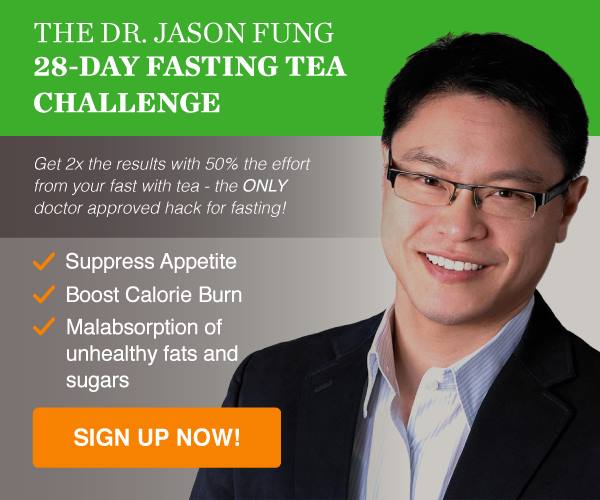
Accessed 11 May. 2021.
It also goes on to claim in the description that the
“program is designed to suppress hunger cravings, boost calorie burn, and soothe digestion so you can achieve your health goals FASTER and EASIER for the long-run.”
The ingredients appear to be green tea, licorice, ginger, citrus peel, and mint. [17] I could not find the dosing of these ingredients, but there is very little to no evidence to support the claims made by this tea. Some may say that these claims are by the company, but the fact is that Dr. Fung’s name is right there on the product box. [18] Now, as with most of Dr. Fung’s claims, there are hints of truth. Ginger, for example, has been demonstrated to help with appetite control, increase the thermic effect of food (minimal effect & the total area under the curve was not different from control), and digestion. [19] Green tea may or may not reduce body weight by a ‘clinically unimportant amount,’ and no green tea extracts have demonstrated consistent appetite-suppressing effects. [20][21][22] Licorice does appear to reduce body weight slightly (just under a pound) but also may raise blood pressure. [23]

On the surface, it appears some of the claims are substantiated. After all, green tea and licorice led to a loss of body weight in clinical trials (albeit very small) and ginger has been demonstrated to reduce appetite and improve digestion. The problem is in the dosage and how extreme the claims are. You see, to get the desired results, research studies have used approximately 2000mg ginger extract, 1500-2500mg licorice extract, and EGCG (the bioactive component of Green Tea) at dosages of approximately 100-460mg/day. [24][25][26][27][28]
The TOTAL polyphenols in the tea in question are 218-327mg. [29] It is unlikely that they contain enough of each compound to achieve meaningful results. Even if they did, in my opinion, it still does not validate the claims of ‘2x the results with 50% of the effort.’ If that is the metric they wish to use, then that means you would be getting 4x the results of an average person who just fasted or dieted without this tea if we standardized for ‘effort’ (i.e., we assume they made a normal effort instead of half effort). Even if we assume that the dosage in the tea is sufficient to reap the effects on weight loss, if we add together the average weight loss in trials for licorice (0.4 kg) and green tea (0.8 kg) we get 1.2 kg of weight loss. [30][31] For that to be 4x as effective, that means the standard treatment would only yield 0.3kg of weight loss if they did ‘50% the effort.’ If that’s the case, then perhaps they need to re-think the effectiveness of their standard treatment. Although if they made a full amount of effort, they’d apparently lose a whopping 0.6 kg using the standard treatment recommended by Dr. Fung.
If there had not been all of that background, I would not go as hard on Dr. Fung as I have the last few years. Unfortunately, he continues to disperse misinformation to the point where I am no longer content to make short Instagram posts or YouTube videos about his claims. Instead, I am sitting down at my keyboard, ready to break down his latest claims regarding nutrition systematically. He was recently on Tom Bilyeu’s podcast Impact Theory discussing his nutrition views. A short 2 minute and 47 second clip from that interview has been making the rounds on Instagram, and the clip so laden with misinformation that I have decided to break down each claim in detail and fully cite my sources so that anyone can check them out for themselves to see what the data REALLY says.
In this clip he states:
“It’s not the number of calories, it’s what your body does with those calories. If you take 100 calories from a cookie… your body has a decision to make to store it as body fat or burn it for energy… and that’s the basal metabolic rate, the number of calories that your body uses in a day, so what your body does with that same 100 calories, you can either become fatter, or you can have a bit more energy during the day. And which one your body does really depends on hormones that are associated with the foods that you’re eating, that’s the real key.”
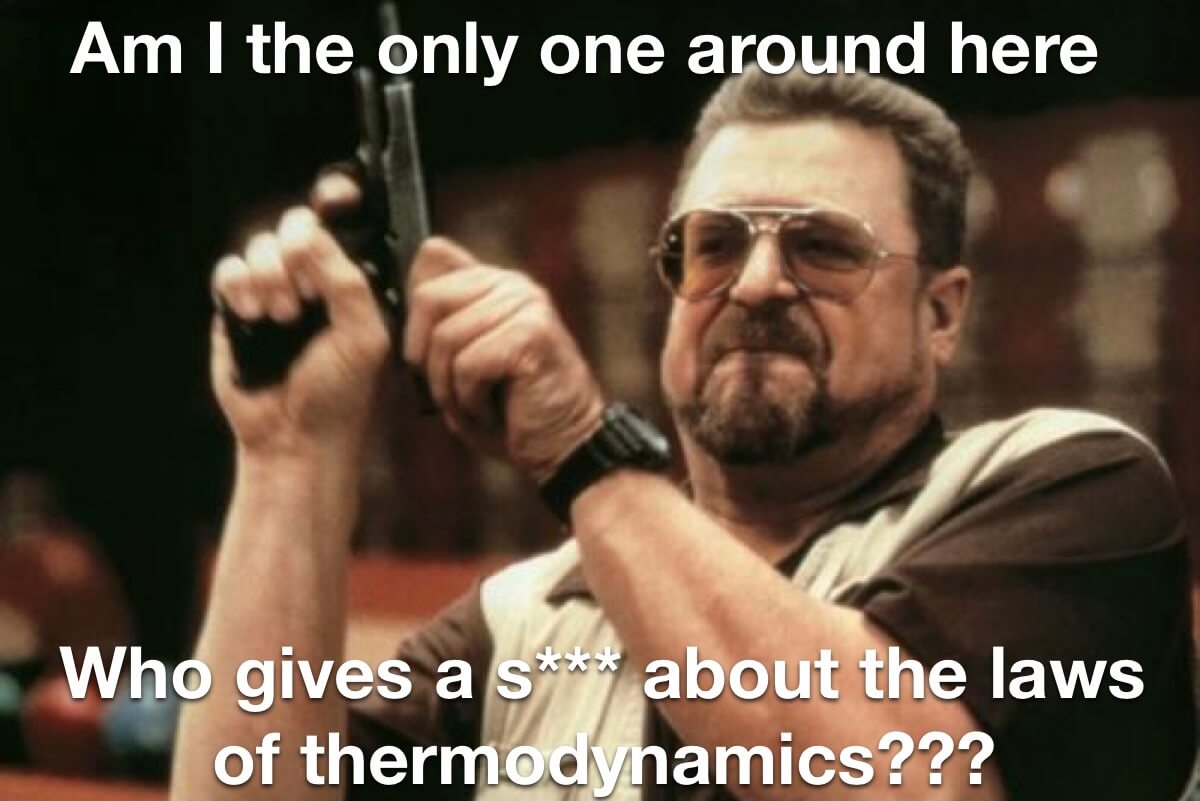
My response: There is a lot to unpack here in less than 20 seconds. First, it’s important to note that Dr. Fung confuses your basal metabolic rate (BMR) with your total daily energy expenditure (TDEE). While BMR is a significant component of your TDEE, the two are not the same thing. TDEE is the TOTAL amount of energy you expend in a day, while BMR refers to the amount of energy you expend at complete rest. [32] Think of it as the amount of energy it requires to ‘keep the lights on.’ For most people, this is anywhere from 50-70% of their TDEE.
Further, he conflates TDEE, BMR, and the thermic effect of food (TEF), which is the amount of energy expended to digest, absorb, and metabolize a food/nutrient, which accounts for approximately 5-10% of your TDEE. [33] The other component of TDEE that he doesn’t mention is your physical activity (PA) which is composed of your exercise activity (EA) and your non-exercise activity thermogenesis (NEAT). [34] EA and NEAT are differentiated based on intent.
EA refers to purposeful movement while NEAT refers to non-purposeful movement such as fidgeting, posture, unintentional pacing, etc. [35] Thus, you can express TDEE as TDEE = BMR + TEF + PA (EA + NEAT). If he is truly referring to how many calories you expend in response to eating a particular food, in this case, a cookie, he is talking about TEF, but he mixes the terminology rendering it difficult to know exactly what he is referring to. This is unsurprising since he does not understand the components of the energy balance equation since he has previously stated that the only two components of TDEE are BMR and exercise. [36]
In terms of the larger issue of the claim that “It’s not how many calories a food has, but what your body does with those calories,” it’s challenging to address because it’s nebulous. Based on Dr. Fung’s previous arguments, he’d likely argue that since cookies are high in sugar, that means 100 calories from that cookie would much more likely be stored as fat compared to 100 calories from something else. [37] It is important to note that calories are simply units of energy measurement, just like miles per hour are a measurement of speed. The caloric content of a food refers to the amount of energy stored in the chemical bonds of that food. Dr. Fung has previously said that “all calories are not equal,” which is likely the argument he is attempting to make here, but it’s fallacious. All calories are equal, the same way each mile per hour on a gauge is the same. They’re the same, just as each second on a clock is the same. [38]
That said, it’s important to note that all caloric sources do not affect energy expenditure in the same way (because of TEF), which is likely the argument he is attempting to make about either storing 100 calories or burning it. I should point out that it’s interesting to note that he submarines his argument by pointing out that calories can be stored or burned for energy, given that he previously claimed that the concept of calories is ‘useless.’ [39] If the concept of calories was useless, why does it matter at all? Why make the argument about storing vs. burning unless he is admitting that the energy content of food does indeed matter? He seems to acknowledge the importance of calorie balance when it suits his narrative but then disregard it when it doesn’t. In fact, he has previously stated that the energy balance equation (calories in vs. calories or CICO) is “ALWAYS TRUE” but then claims that restricting your calories will not lead to weight loss (more on this later). [40] It’s a bizarre way to frame his argument, but I digress.
What Dr. Fung is likely attempting to highlight here is the differences in TEF between sources of calories. All sources of calories are not equal in terms of how they impact your body’s energy expenditure. Protein has a significantly higher TEF (20-30% of ingested energy is spent metabolizing protein) compared to carbohydrate (5-10%) or fat (0-3%). [41] Dr. Fung and other like-minded people will use this fact to form a strawman argument against the idea of energy balance, aka calories in vs. calories out (CICO), on the basis that it assumes all calories are the same. While we already discussed that all calories are the same because calories are simply a unit of measurement, all sources of calories are not the same, and CICO does not assume they are the same. [42] That said, Dr. Fung frequently advocates for low-carb diets and insulin minimization via low-carb diets, but this is incongruent with the argument regarding TEF since the TEF of carbohydrate is greater than that of fat. [43] It’s important to note that TEF makes up a relatively small proportion of energy expenditure, and there is very little difference between fat/carbohydrate. Therefore, any significant differences in energy expenditure are likely due to differences in protein, though the differences are relatively small. For example, if someone ate a diet of 25% protein, 50% carbohydrate, and 25% fat at 2000 calories, we would assume their TEF would be approximately the following:
Protein: 500 kcal x 0.2-0.3 = 100-150 kcal/d
Carbohydrate: 1000 kcal x 0.05 – 0.10 = 50-100 kcal/d
Fat: 500 kcal x 0-0.03 = 0-15 kcal/d
Total = 150-265 kcal/d TEF
Now let’s say this same person DOUBLED their protein in exchange for carbohydrate:
Protein 1000 kcal x 0.2-0.3 = 200-300 kcal/d
Carbohydrate: 500 kcal x 0.05-0.10 = 25-50 kcal/d
Fat: 500 kcal x 0-0.03 = 0-15 kcal/d
Total = 225-365
So you are looking at about a 100 calorie difference per day by DOUBLING protein. I’m not saying it doesn’t matter, but it’s 5% of your daily calorie intake. It’s not going to make a massive difference.
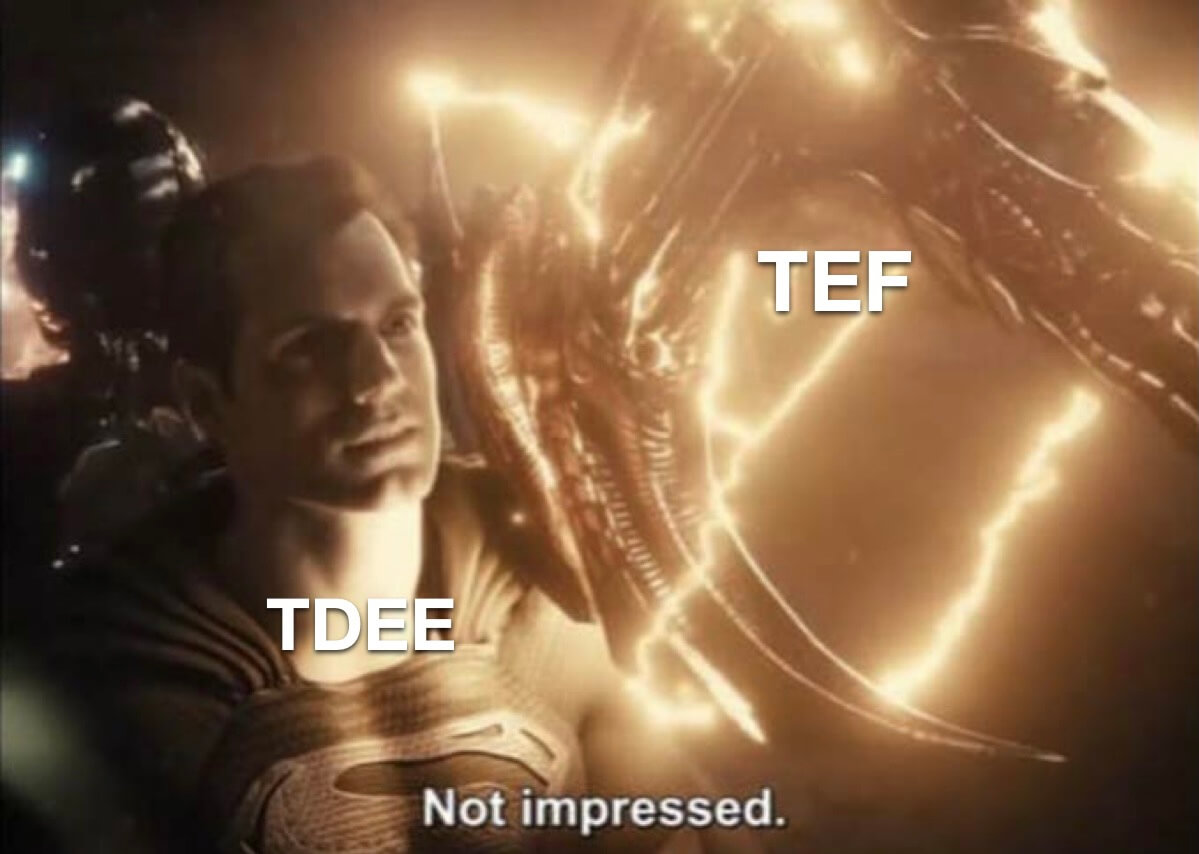
Let’s discuss the closing sentence of this first statement. Dr. Fung says:
“It really depends on which hormones are associated with the foods you are eating, that’s the real key.”
Dr. Fung has spent many articles and videos nebulously discussing ‘hormones,’ but rarely will he specifically talk about which hormones he is referencing. Some hormones indeed DO impact energy expenditure, for example, thyroid hormone (T3). [44] In fact, people with low thyroid hormone may experience reductions in BMR of up to 25%. [45] This might mean that a person who has a BMR of 1600 kcal/d instead has a BMR of 1200 kcal/d. Keep in mind that this is just BMR, one component of TDEE. That said, Dr. Fung rarely speaks about thyroid hormone other than to speculate that perhaps intermittent fasting (a methodology he heavily promotes) may help improve the condition of people with hypothyroidism. [46] Interestingly, fasting decreases thyroid hormone and energy expenditure in the short term. [47][48]
The hormone he typically speaks about is insulin, and he claims that to lose weight, you must control insulin. [49][50][51] Typically, he recommends that people avoid refined carbohydrates (though he doesn’t necessarily advocate for low carb in general) and practice intermittent fasting to control insulin. [52] He notes that insulin is the fat storage hormone. [53] While insulin does inhibit lipolysis, fat oxidation, and increases fat uptake into adipose, its effects on body fat levels are more complicated. [54][55] Dr. Fung and those who focus on insulin as the primary driver of body fatness over energy balance tend to focus on insulin inhibiting fat oxidation and lipolysis. [56] These are two required steps to burn stored body fat. First, the fatty acids must be liberated from their stored triacylglyceride form from adipose tissue; this is lipolysis. These fatty acids must then be oxidized through beta-oxidation, whereby the fatty acids are cleaved into 2 carbon units to form acetyl-CoA, which can then enter the Krebs cycle for energy production/oxidative respiration to produce adenosine triphosphate (ATP), the energy currency of the cell. Cool, right? Seems pretty straightforward that if insulin impedes this process, it should cause fat gain or impede fat loss. This is only one side of the body fatness equation, however. This ‘insulin theory’ of body fatness completely neglects the other side of the body fatness equation: how much fat is stored into adipose tissue.
The equation could be expressed as a Body fat balance equation whereby Body Fat Balance = Fat stored – Fat oxidized.
So what, right? After all, insulin increases fat storage. Again, it’s not that simple. Before you blame insulin for the cause of obesity, understand that fat can be stored in adipose without increases in insulin via a protein called acylation stimulating protein (ASP). [57] Why is this important? It’s crucial to understand that fat can be stored in adipose cells without increases in insulin because of dietary fat, which is stored in adipose cells. In fact, of the fat that winds up in adipose tissue, over 98% of it comes from dietary fat, and less than 2% comes from dietary carbohydrates. [58] Now consider that if we truly want to test whether or not it’s calories or insulin that are the primary drivers of obesity, we have to compare diets that are equal in calories but differ in insulin response. This can be easily done by varying the amount of carbohydrate vs. fat in the diet (fat isn’t an insulin secretagogue) while keeping protein constant and examining the amount of fat gained or lost. It’s essential to keep protein constant because protein increases energy expenditure significantly more than carbohydrates or fats, if you recall. Fortunately, we have a plethora of studies to draw from when examining this question.
A meta-analysis of over 20 controlled feeding studies (food was either provided to subjects or the subjects were housed in a controlled environment where adherence was not an issue) demonstrated that there were virtually no differences in fat loss between diets that were high in carbohydrate vs. those low in carbohydrate when calories and protein were equated. [59] In fact, this study showed small favoritism for fat loss towards the diets that were lower in fat. However, this difference (approximately 16g more fat loss per day) is likely clinically irrelevant. [60]
One of the studies in the meta-analysis examined a very low carb (~30g/d) ketogenic diet versus a very high carb (>300g/d) diet. Both were equal in calories/protein, and the goal was to examine their effects on fat loss.[61] Not only did this study show that fat loss slightly favored the low-fat group, but the study also demonstrated that the low fat group had total daily insulin levels that were ~47% lower than the low carb group. If Dr. Fung’s claims about insulin mattering vs. calories were true, then these results could not be accurate. The results are a DIRECT REFUTATION of Dr. Fung’s claims regarding insulin.
How could these results be true based on the biochemistry of insulin? As we discussed before, fat balance is the balance between the amount of fat stored vs. the amount of fat burned. On a low-carb diet, fat burning increases significantly. [62] On a low fat, high carb diet, fat oxidation is inhibited. [63] However, as you might recall, since dietary carbohydrate is not stored as fat, on a low carb, higher fat diet, you will have greater rates of fat oxidation, but also greater rates of fat storage. Think of it like this, if we compare 2 diets equal in protein and calories but either high or low in carbohydrates or fats we get the following results:
High Fat Low Carb Diet: High fat stored but high fat burned.
High Carb Low Fat Diet: Low fat stored but low fat burned.
To express it more easily, I have included a hypothetical figure from my book, Fat Loss Forever, and it compares these two diets and their effects on fat storage/burning.
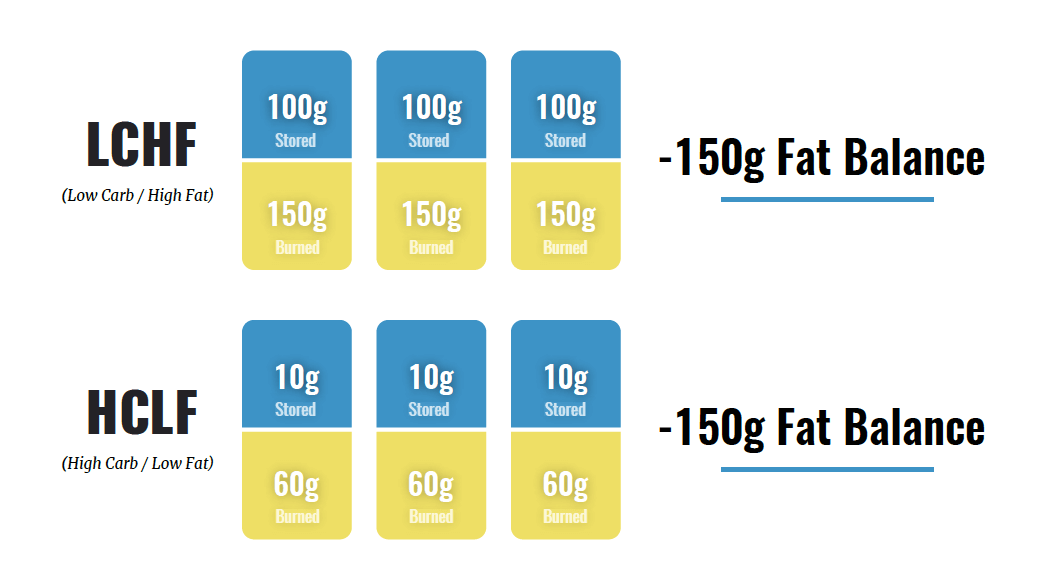
As you can see in this example, if calories and protein are equated, your daily fat balance is the same (in this example of 3 meals, either high in fat/low in carb or high in carb/low in fat). This is also supported by overfeeding studies demonstrating that overfeeding both carbohydrate and fat are equally fattening. [64] Further, insulin levels do not predict weight gain over time. [65] Moreover, one of the most effective pharmaceutical obesity treatments on the market is Semaglutide, which induces large reductions in fat mass (due to appetite suppression) and significantly INCREASES insulin secretion but over the long term improves insulin sensitivity due to weight loss. [66] These studies are DEVASTATING to Dr. Fung’s argument that it is insulin, not calories, that matter for weight loss.
Furthermore, if insulin somehow impeded weight loss, it would do so through either reducing energy expenditure or increasing energy intake. Insulin cannot create matter out of NOTHING.
As we discussed, the data on diets that compare calorie/protein equated weight loss diets that vary in carbohydrate and fat content show no real differences in energy expenditure. [67] Dr. Fung has also claimed that insulin makes you hungry. [68] The ‘evidence’ for this is extremely thin and in opposition to the human outcome data. If insulin increased hunger, we’d expect to see people eat more on higher carb diets than lower carb diets, but in a recent highly controlled study, the exact opposite was observed. [69] The notion that insulin would make you hungrier also does not make sense from a mechanistic perspective. Insulin increases leptin secretion, and leptin is the major satiety hormone. [70] Moreover, when insulin is infused in physiologic concentrations, some studies show that it DECREASES energy intake in rodents and humans. [71][72][73][74]
Dr. Fung may argue that he does not advocate for low-carb diets to control insulin, which is somewhat true, as he mainly advocates intermittent fasting. [75] While intermittent fasting (IF) aka time restricted feeding (TRF) can be a useful tool for fat loss, it does not appear to be superior to normal calorie restriction for fat loss, and similar improvements are also observed for measures of insulin sensitivity like HbA1c, though more research is needed (it should be noted that these results hold true even with protocols such as alternate day fasting). [76][77][78] How could this be? According to Dr. Fung, since you are keeping insulin low by fasting, shouldn’t you lose more fat? This is where people neglect the concept of daily or even weekly energy balance. You can’t fast your entire life since that would result in death. At some point, you must eat food. To determine if the effects observed on fat loss are due to low insulin or simply caloric restriction, we must equate calories over some time and observe what occurs. Indeed, as we discussed, the previously cited meta-analysis and systematic reviews that examined diets equivalent in daily or weekly calories but compared some form of IF/TRF to continuous caloric restriction saw NO differences in fat loss. While it’s true that fasting will keep insulin low during the fast, it’s important to note that if you fast for, say, 20 hours per day, but eat all your calories in a 4 hour period, that is typically a LOT of calories you are throwing down in a short time. If you were comparing 2 diets equal in calories (let’s say 1800 kcal/d), but one diet spread the calories out over 4 meals, and the other did it in a single meal, sure you would have more insulin responses in the 4 meal diet; however, each individual insulin response would be smaller whereas the large single meal would likely be a massive insulin response. Moreover, if we recall our fat balance equation from earlier, a TRF approach would produce a large amount of fat oxidation during the fasting period, but this would be balanced with a large amount of fat storage during the short feeding period. The net effect would be no difference in fat loss when calories are equated.
IF zealots will likely strawman my argument and point out the large numbers of people who have lost fat and improved their insulin sensitivity, and possibly even cured their diabetes using an IF approach. I am NOT saying that IF does not work. It certainly works just as well as typical caloric restriction for fat loss. This is excellent news because it means that the individual can choose the best approach for them. However, this is not what Dr. Fung tells people. He claims that they can’t lose fat unless they control insulin, and his usual recommended way of doing that is through some variation of IF. [79] Once again, the evidence from the highest quality of research (systematic reviews & meta-analysis) is devastating to Dr. Fung’s argument. If fasting to control insulin was more important than the caloric content of food, why do none of these literature reviews show differences in fat loss when calories are equated?
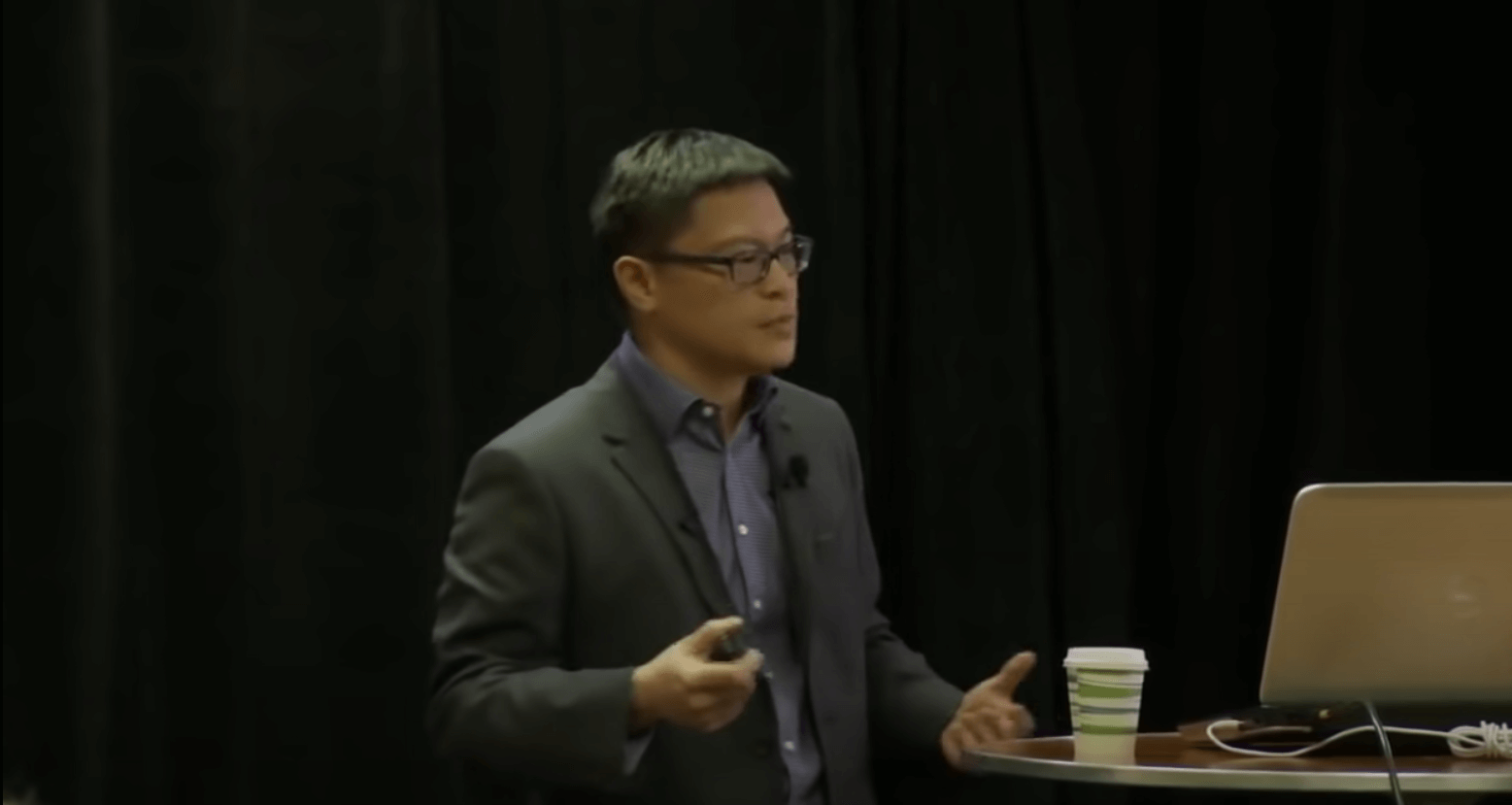
Another problem with Dr. Fung’s insulin hypothesis is that protein is quite insulinogenic, in many cases more so than carbohydrates. [80][81][82] In fact, 240 calories of beef elicited the SAME insulin secretion as 240 calories of bread and 240 calories of fish elicited the same insulin response as 240 calories of rice. [83] If insulin was truly the cause of obesity, we would expect to see high protein diets also be deleterious for fat loss and insulin sensitivity, but we actually see the opposite. [84][85][86][87][88]
So let’s sum up the first few seconds of this video clip:
- Dr. Fung confuses BMR, TDEE, and TE
- Dr. Fung believes that your TDEE only has two components: your BMR and exercise (even though he vaguely references TEF)
- Dr. Fung says that it’s not the calories that are important, even though he makes a big deal regarding whether your body stores those calories or burns them
- Dr. Fung claims that the hormones associated with the foods you eat are more important than their calorie content

1:08: “If you eat 500 calories less, your body can simply decide to burn 500 calories less, and you won’t lose any body fat.”
My Response: This is another example of Dr. Fung sprinkling in the slightest amount of truth with a lot of fallacy. While he does not identify it, Dr. Fung is referring to the fact that during caloric restriction and weight loss, a phenomenon known as ‘metabolic adaptation’ occurs whereby your body reduces energy expenditure to preserve energy stores. [89] Now, that may sound scary, but Dr. Fung’s description makes it seem like as soon as you reduce your calorie intake, your body immediately adjusts to compensate. That is NOT how metabolic adaptation works. The most extreme example of metabolic adaptation I could find in the literature was the study on the Biggest Loser participants. They lost well over 100 lbs in 30 weeks and incurred a reduction in BMR of 499 calories from metabolic adaptation. [90] Other studies have demonstrated far less metabolic adaptation in response to dieting, the majority of which demonstrate a ~5-15% reduction in BMR from significant weight loss. [91][92][93]
What is more important to note about metabolic adaptation is that it still occurs to the same extent as normal caloric restriction even when following low carb diets, low glycemic diets, or IF/TRF protocols as Dr. Fung recommends. [94][95][96][97] In fact, one study demonstrated that energy expenditure was greater on a high carb diet compared to a low carb diet when calories were equated. It is unlikely that simply eating 500 calories less will cause 500 calories per day attenuation in energy expenditure, and even if it could, there is NO EVIDENCE that low carb diets, low glycemic diets, or IF/TRF diets somehow are superior for attenuating this response.
1:22: “Thermodynamics assumes that your basal metabolic rate remains absolutely rock stable.” He also goes on to say, “cutting 500 calories per day, which has been the standard advice, is very unsuccessful because if you don’t change the hormonal system in your body, different foods contain different hormonal instructions, your body could simply decide to burn 500 calories less, and you will not lose body fat.”
My Response: Once again, Dr. Fung mixes up his terms. He refers to energy balance (CICO) but calls it ‘thermodynamics.’ While thermodynamics is the law upon which energy balance operates, the two are terms that shouldn’t be used interchangeably. In any case, he is referring to energy balance, but his statement that it “assumes that your basal metabolic rate remains absolutely rock stable” is COMPLETELY ERRONEOUS. On the contrary, experts who study energy balance frequently point out that the body tries to compensate for changes in energy intake (CI) by adjusting energy expenditure. [99][100][101] One of the most prominent energy balance researchers, Kevin Hall, literally says this in a recent review paper. “We now understand that energy intake and expenditure are interdependent variables that are dynamically influenced by each other and body weight,” Dr. Hall states. Contrary to Dr. Fung’s strawman argument, it’s clear that leading energy balance researchers acknowledge that these are not independent variables.
Furthermore, Dr. Fung implies that this metabolic adaptation is somehow extremely fast so that if you reduce calories, your body compensates for it extremely quickly. This is not true. Research shows that to create significant metabolic adaptation, it requires weeks or months at a deficit, and only in the case of the Biggest Loser study where participants were in SEVERE deficits of thousands of calories every day do we see almost a 500 calorie metabolic adaptation after 30 WEEKS OF SEVERE RESTRICTION. [102]
In the case of most weight loss studies that occur over multiple months, metabolic adaptation rarely exceeds 200-300 calories per day and in some studies with modest calorie deficits is hardly detectable after a few months. [103][104][105] Furthermore, the implication that Dr. Fung is making is that somehow caloric restriction will cause metabolic adaptation. But if you follow HIS protocols, there will be a different outcome, which we have already established is simply not true.
While people can lose weight without tracking calories using low carb diets and IF/TRF protocols, the simple act of not tracking calories does NOT mean those people aren’t restricting calories, just like the mere act of saving money while not keeping a budget does NOT mean that you somehow managed to save money while not earning more than you spent. You might say I’m too hard on Dr. Fung here and that he hasn’t made that implication. The reality is that he has made a far more insane statement previously. On his website, there is an article titled “Calorie Counting Wrecks Your Metabolism.” [106] This is like saying keeping a budget will cause you to go broke. He is confusing a tool with a physiological process. There are only two possible outcomes that I can think of.
- Dr. Fung doesn’t know the difference between a calorie deficit and calorie tracking (this is likely as many people assume they are the same thing… which they’re not) or
- He knows the difference, and he’s simply using fear tactics to push his preferred dietary methods. I think #1 is very likely given his overall confusion between terms and contradicting statements in this short clip.

2:07: “It’s not true to say if you cut 500 calories down, you’ll lose a pound of body fat a week.”
My Response: I somewhat agree with this statement here. While 3500 calories approximately equates to 1 lb of stored triglyceride in adipose tissue, the notion that simply eating 3500 calories less across a week will result in 1 lb of body fat loss is a bit too simplistic. As we already stated, the body does have elaborate compensatory mechanisms in place, and whole-body physiology is messy. Further, it’s impossible to know EXACTLY how many calories you are taking in vs. expending. People against calorie counting will argue this is why it’s a waste of time to count calories since you can’t know exactly how much you are eating or expending due to food label errors and large errors in energy expenditure trackers (hint: your smartwatch has no idea how many calories you burn during exercise and it probably overestimates by 30-100%). [107][108][109]
This is like saying that it’s useless to keep a budget. After all, you can never know precisely how much you will earn and exactly how much you will spend because your car can break down, or you need to repair your roof, or you have variable interest investments that fluctuate. Just because you cannot track something exactly does NOT mean it’s completely worthless to try. For example, let’s say that someone was eating 2000 calories per day and believed that should be a 500 calorie deficit. Yet after a few weeks, they had not lost as much weight as they would have predicted. Perhaps they were eating 2200, but since they can’t track it EXACTLY, they weren’t aware that they were eating 10% more. This doesn’t mean that eating in a 500 calorie deficit won’t produce weight loss. It simply means that you aren’t in the deficit you THINK you are, but it’s easy to know this because you can see that you aren’t losing weight at the rate you would predict. As such, it simply means that you need to adjust your calories down until you hit the desired rate of loss.
As we also discussed, metabolic adaptation will mean that even if you start out in a 500 calorie deficit, over time, that deficit will no longer be 500 calories due to reductions in energy expenditure. This doesn’t mean that calorie deficits are worthless, as we already went through in painful detail. After all, Dr. Fung’s recommendations only work because they can induce a calorie deficit, not through reductions in insulin, as he claims.
2:44: “It’s not the total number of calories that’s important. It’s what your body does with those calories, and that depends on hormones.”
My Response: As I have already demonstrated in PAINFUL detail, there is no evidence to support this claim that Dr. Fung is making. I’m not sure how many more research studies we need to refute these claims as the evidence is quite overwhelming. That said, it’s important to point out what I’m NOT saying in this article.
I am not saying that hormones do not matter for weight loss. As I have already pointed out, hormones like T3 can impact weight loss through reductions in energy expenditure. ANY hormone that impacts weight loss is going to do so through modifying either energy intake or energy expenditure, not through some sort of hocus pocus magic.
I am not saying that insulin plays no role in weight gain or weight loss. Indeed, it may play a small role, but it is not the dominant factor and is likely more of a passive player than it is active.
I am not saying low carb does not work. It certainly does. However, it works by creating a calorie deficit through reductions in food intake, not because of low insulin.
I am not saying that IF/TRF does not work. It certainly does. However, it works by creating a calorie deficit through reductions in food intake, not by controlling insulin or increasing metabolic rate.
I am NOT saying that energy expenditure isn’t modifiable based on energy intake. It most certainly is! However, low carb or IF/TRF diets are not superior to other calorie/protein matched diets for preventing metabolic adaptation during weight loss.
Now some of you might ask, “Ok, maybe his claims aren’t completely accurate, but if it helps people lose weight and get healthy, what is the harm?”
The harm is that singling out foods, macronutrients, or hormones as ‘good’ or ‘bad’ can create disordered eating patterns in some people. I can’t tell you the number of people who have come to me from Fung or other people with similar views who tried so hard to cut carbs or fast as long as possible because they believed that was the only way to lose weight. When their will inevitably broke, they would binge eat and add a lot of weight in a short period. This acted only to reinforce that carbohydrates or not fasting long enough was the problem. After all, when they weren’t eating carbs, or they were fasting, they were losing weight, and it was only after they broke their fast or ate carbs that they put on weight. Never mind that they added weight because they binge ate and consumed massive amounts of carbs AND fats in most cases. Indeed there is quite a bit of evidence to demonstrate that people who have rigid mindsets around foods (create ‘good’ or ‘bad’ foods) have a much higher incidence of binge eating disorder than people with a flexible mindset around food. [110][111]
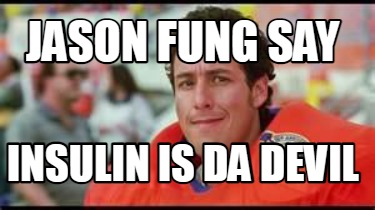
I’m not saying that low-carb diets or IF/TRF cause binge eating. A rigid mindset around food is what tends to cause binge eating. A low carb diet or IF/TRF can be used with a flexible mindset when the person understands the reason these diets work is by creating a calorie deficit. That way, they don’t freak out if they have a higher carb meal as they realize they can adjust their overall intake accordingly. They don’t stress if they break their fast at 14 hours instead of 16 hours because they understand there isn’t anything magical about fasting; they just have to control their overall energy intake. What Dr. Fung promotes, however, is not flexible. It is a rigid model of dieting. In my opinion, what is shown to people is that if you eat any foods that cause an insulin response, you will not be able to lose fat. Not only is this not true, but it’s also a dangerous mindset to instill in people as it can create a black/white mentality. Instead of having a single cookie, or a small slice of pizza, or any ‘bad’ food the person might want to consume in moderation and move on with life, someone who has been led to believe that insulin is the devil is more likely to enter ‘fuck it’ mode and go crazy since in their mind they already ruined their diet anyway.
The methodologies that Dr. Fung promotes for weight loss and type 2 diabetes treatment can be effective. The reasons he provides for WHY they are effective are misleading, not supported by evidence, and simply used to drive his narrative.
References
- “The Obesity Code: Unlocking the Secrets of … – Red Pen Reviews.” 4 Nov. 2019, https://www.redpenreviews.org/reviews/the-obesity-code-unlocking-the-secrets-of-weight-loss/. Accessed 10 May. 2021.
- “The Evidence for Caloric Restriction: A Response to Dr. Fung’s CRaP.” https://www.myoleanfitness.com/evidence-caloric-restriction/. Accessed 10 May. 2021.
- “‘Obesity Code’ Diet – Healthline.” 5 Oct. 2018, https://www.healthline.com/health-news/debunking-the-obesity-code-diet. Accessed 10 May. 2021.
- “The Great Ketogenic Diet Debate | The Doctors TV Show.” 6 Feb. 2019, https://www.thedoctorstv.com/articles/great-ketogenic-diet-debate. Accessed 10 May. 2021.
- “Avi Bitterman, MD on Twitter: “Vegans: This is important. The well ….” 18 Mar. 2020, https://twitter.com/avibittmd/status/1240317942794981377. Accessed 10 May. 2021
- “Avi Bitterman, MD on Twitter: “Instead of defending his views that we ….” 22 Mar. 2020, https://twitter.com/avibittmd/status/1241797154693316610. Accessed 10 May. 2021.
- “Billions of People Do Calorie Reduced Diets & Only Few Lose ….” 24 Jul. 2020, https://www.biolayne.com/media/videos/what-the-fitness/billions-of-people-do-calorie-reduced-diets-only-few-lose-weight/. Accessed 10 May. 2021.
- “Layne Norton, PhD on Instagram: “MEEESAH DR. JASON FUNG ….” 23 Jun. 2020, https://www.instagram.com/p/CBycOoZp45h/. Accessed 10 May. 2021.
- Fat shaming, explained in one terrible tweet – Vox.” 3 Nov. 2016, https://www.vox.com/2016/11/3/13510410/fat-shaming-tweet. Accessed 10 May. 2021.
- “Yoni Freedhoff, MD on Twitter: “From the archives of strange but true ….” 28 Feb. 2019, https://twitter.com/yonifreedhoff/status/1101140278377877508. Accessed 10 May. 2021.
- “Stephan Guyenet, PhD on Twitter: “Here’s the thread where ….” 8 Oct. 2020, https://twitter.com/AlastairMcA30/status/1314090007523594241?s=20. Accessed 10 May. 2021.
- “Intermittent fasting and weight loss: Systematic review – PubMed.” https://pubmed.ncbi.nlm.nih.gov/32060194/. Accessed 11 May. 2021.
- “Effectiveness of Intermittent Fasting and Time-Restricted Feeding ….” 14 Oct. 2019, https://www.ncbi.nlm.nih.gov/pmc/articles/PMC6836017/. Accessed 11 May. 2021.
- “Low Carbohydrate versus Isoenergetic Balanced Diets … – NCBI – NIH.” 9 Jul. 2014, https://www.ncbi.nlm.nih.gov/pmc/articles/PMC4090010/. Accessed 11 May. 2021.
- “Effects of Low-Carbohydrate Diets Versus Low-Fat Diets on ….” https://www.ncbi.nlm.nih.gov/pmc/articles/PMC3530364/. Accessed 11 May. 2021.
- “Dr. Jason Fung 28-Day Fasting Tea Challenge – Facebook.” https://www.facebook.com/events/httpsbitly2sct8ca/dr-jason-fung-28-day-fasting-tea-challenge/235567304063336/. Accessed 11 May. 2021.
- Ginger Green Fasting Tea | Fasting Tea Formulated With Dr. Jason ….” https://www.piquetea.com/products/ginger-green-fasting-tea. Accessed 11 May. 2021.
- “Ginger Green Fasting Tea | Fasting Tea Formulated With Dr. Jason ….” https://www.piquetea.com/products/ginger-green-fasting-tea. Accessed 11 May. 2021.
- Ginger consumption enhances the thermic effect of … – NCBI – NIH.” 24 Apr. 2012, https://www.ncbi.nlm.nih.gov/pmc/articles/PMC3408800/. Accessed 11 May. 2021.
- “Green tea for weight loss and weight maintenance in … – PubMed.” 12 Dec. 2012, https://pubmed.ncbi.nlm.nih.gov/23235664/. Accessed 11 May. 2021.
- “Appetite-Suppressing and Satiety-Increasing Bioactive … – NCBI – NIH.” 17 Sep. 2019, https://www.ncbi.nlm.nih.gov/pmc/articles/PMC6769678/. Accessed 11 May. 2021.
- “Effect of green tea or green tea extract consumption on … – NCBI – NIH.” https://www.ncbi.nlm.nih.gov/books/NBK231811/. Accessed 11 May. 2021.
- “Metabolic changes after licorice consumption: A systematic review ….” 15 Jan. 2018, https://pubmed.ncbi.nlm.nih.gov/29433679/. Accessed 11 May. 2021.
- “[Effects of green tea and its epigallocatechin (EGCG … – PubMed.” 5 Jun. 2017, https://pubmed.ncbi.nlm.nih.gov/28627214/. Accessed 11 May. 2021.
- “Ginger consumption enhances the thermic effect of … – NCBI – NIH.” 24 Apr. 2012, https://www.ncbi.nlm.nih.gov/pmc/articles/PMC3408800/. Accessed 11 May. 2021.
- “Effect of licorice on the reduction of body fat mass in healthy subjects.” https://pubmed.ncbi.nlm.nih.gov/14594116/. Accessed 11 May. 2021.
- “Metabolic changes after licorice consumption: A systematic review ….” 15 Jan. 2018, https://pubmed.ncbi.nlm.nih.gov/29433679/. Accessed 11 May. 2021.
- “The Effect of Dried Glycyrrhiza Glabra L. Extract on Obesity ….” https://www.ncbi.nlm.nih.gov/pmc/articles/PMC5527236/. Accessed 11 May. 2021.
- “Ginger Green Fasting Tea | Fasting Tea Formulated … – Pique Tea.” https://www.piquetea.com/products/ginger-green-fasting-tea. Accessed 11 May. 2021.
- “Effect of green tea or green tea extract consumption on … – NCBI – NIH.” https://www.ncbi.nlm.nih.gov/books/NBK231811/. Accessed 11 May. 2021.
- “Metabolic changes after licorice consumption: A systematic review ….” 15 Jan. 2018, https://pubmed.ncbi.nlm.nih.gov/29433679/. Accessed 11 May. 2021.
- “A review: exercise and its influence on resting energy metabolism in ….” https://pubmed.ncbi.nlm.nih.gov/2691813/. Accessed 11 May. 2021.
- “The Thermic Effect of Food: A Review – PubMed.” 25 Apr. 2019, https://pubmed.ncbi.nlm.nih.gov/31021710/. Accessed 11 May. 2021.
- “Non-exercise activity thermogenesis (NEAT): a … – PubMed.” https://pubmed.ncbi.nlm.nih.gov/30149423/. Accessed 11 May. 2021.
- “Non-exercise activity thermogenesis (NEAT): a … – PubMed.” https://pubmed.ncbi.nlm.nih.gov/30149423/. Accessed 11 May. 2021.
- “The Failure of the Calorie Theory of Obesity | Online Fasting Method ….” https://thefastingmethod.com/the-failure-of-the-calorie-theory-of-obesity/. Accessed 12 May. 2021.
- “Sugar and Obesity – Fructose 3 | Online Fasting Method for ….” https://thefastingmethod.com/sugar-obesity-fructose-3/. Accessed 11 May. 2021.
- All Calories Are Different (Science) | Jason Fung – YouTube.” 22 Nov. 2020, https://www.youtube.com/watch?v=_nt6KAUvedI. Accessed 11 May. 2021.
- “The Useless Concept of ‘Calories’ | by Dr. Jason Fung | Personal ….” 13 Nov. 2017, https://medium.com/personal-growth/the-useless-concept-of-calories-50831730cc81. Accessed 11 May. 2021.
- “The Failure of the Calorie Theory of Obesity | Online Fasting Method ….” https://thefastingmethod.com/the-failure-of-the-calorie-theory-of-obesity/. Accessed 12 May. 2021.
- “Diet induced thermogenesis – NCBI – NIH.” 18 Aug. 2004, https://www.ncbi.nlm.nih.gov/pmc/articles/PMC524030/. Accessed 12 May. 2021.
- “Energy balance and its components: implications for … – NCBI – NIH.” https://www.ncbi.nlm.nih.gov/pmc/articles/PMC3302369/. Accessed 12 May. 2021.
- “Diet induced thermogenesis – NCBI – NIH.” 18 Aug. 2004, https://www.ncbi.nlm.nih.gov/pmc/articles/PMC524030/. Accessed 12 May. 2021.
- “Thyroid hormone as a determinant of energy expenditure and the ….” https://pubmed.ncbi.nlm.nih.gov/18279014/. Accessed 12 May. 2021.
- “Physiological and Metabolic Changes During the … – PubMed.” https://pubmed.ncbi.nlm.nih.gov/27465032/. Accessed 12 May. 2021.
- “Intermittent Fasting – Questions & Answers with Dr. Fung – Diet Doctor.” 16 Nov. 2020, https://www.dietdoctor.com/intermittent-fasting/questions-and-answers. Accessed 12 May. 2021.
- “Effects of Short-Term Fasting and Different … – PubMed – NIH.” https://pubmed.ncbi.nlm.nih.gov/31298652/. Accessed 12 May. 2021.
- “Energy Expenditure Responses to Fasting and … – NCBI – NIH.” https://www.ncbi.nlm.nih.gov/pmc/articles/PMC4613969/. Accessed 12 May. 2021.
- “Dr. Jason Fung: To Lose Weight, You MUST control Insulin – YouTube.” 9 Dec. 2017, https://www.youtube.com/watch?v=3d7KkyXnyB4. Accessed 12 May. 2021.
- “The Biochemistry of Insulin Resistance — Diet Doctor.” 22 Sep. 2019, https://www.dietdoctor.com/the-biochemistry-of-insulin-resistance Accessed 12 May. 2021.
- “Dr. Jason Fung: My single best weight loss tip — Diet Doctor.” 4 Nov. 2018, https://www.dietdoctor.com/my-single-best-weight-loss-tip. Accessed 12 May. 2021.
- “What is Insulin Resistance? | Online Fasting Method for intermittent ….” https://thefastingmethod.com/what-is-insulin-resistance. Accessed 12 May. 2021.
- “Dr. Jason Fung: My single best weight loss tip — Diet Doctor.” 4 Nov. 2018, . Accessed 12 May. 2021.
- “Insulin regulation of lipolysis in nondiabetic and … – PubMed – NIH.” https://pubmed.ncbi.nlm.nih.gov/2573554/. Accessed 12 May. 2021.
- “Fatty Acid Oxidation and Its Relation with Insulin … – PubMed.” 9 Dec. 2016, https://pubmed.ncbi.nlm.nih.gov/27931032/. Accessed 12 May. 2021.
- “The Biochemistry of Insulin Resistance — Diet Doctor.” 22 Sep. 2019, https://www.dietdoctor.com/the-biochemistry-of-insulin-resistance. Accessed 12 May. 2021.
- “Acylation stimulating protein (ASP), an adipocyte autocrine: new ….” https://pubmed.ncbi.nlm.nih.gov/10355026/. Accessed 12 May. 2021.
- “De novo lipogenesis in humans: metabolic and regulatory aspects.” https://pubmed.ncbi.nlm.nih.gov/10365981/. Accessed 12 May. 2021.
- “Obesity Energetics: Body Weight Regulation and the … – PubMed – NIH.” 11 Feb. 2017, https://pubmed.ncbi.nlm.nih.gov/28193517/. Accessed 12 May. 2021.
- “Calorie for Calorie, Dietary Fat Restriction Results in More Body Fat ….” 1 Sep. 2015, https://pubmed.ncbi.nlm.nih.gov/26278052/. Accessed 12 May. 2021.
- “Energy expenditure and body composition changes … – PubMed – NIH.” 6 Jul. 2016, https://pubmed.ncbi.nlm.nih.gov/27385608/. Accessed 12 May. 2021.
- “Energy expenditure and body composition changes … – PubMed – NIH.” 6 Jul. 2016, https://pubmed.ncbi.nlm.nih.gov/27385608/. Accessed 12 May. 2021
- “Effect of isoenergetic low- and high-carbohydrate diets on substrate ….” https://pubmed.ncbi.nlm.nih.gov/12908902/. Accessed 12 May. 2021.
- “Effects of isoenergetic overfeeding of either carbohydrate … – PubMed.” https://pubmed.ncbi.nlm.nih.gov/11029975/. Accessed 12 May. 2021.
- “The entero-insular axis and adipose tissue-related factors … – Nature.” 28 Nov. 2006, https://www.nature.com/articles/0803500. Accessed 12 May. 2021.
- “Once-Weekly Semaglutide in Adults with Overweight or Obesity.” 18 Mar. 2021, https://pubmed.ncbi.nlm.nih.gov/33567185/. Accessed 12 May. 2021.
- “Obesity Energetics: Body Weight Regulation and the … – PubMed – NIH.” 11 Feb. 2017, https://pubmed.ncbi.nlm.nih.gov/28193517/. Accessed 18 May. 2021.
- “Controlling Hunger-Part 1. Have you eaten a loaf of … – Dr. Jason Fung.” https://drjasonfung.medium.com/controlling-hunger-part-1-627ab2d751fa. Accessed 18 May. 2021.
- “Ad Libitum Energy Intake Differences Between a Plant-Based, Low ….” 29 May. 2020, https://www.ncbi.nlm.nih.gov/pmc/articles/PMC7258127/. Accessed 18 May. 2021.
- “Insulin increases plasma leptin concentrations in normal subjects ….” https://pubmed.ncbi.nlm.nih.gov/8858224/. Accessed 18 May. 2021″>.
- “Reduction of food intake and body weight by chronic … – PubMed – NIH.” https://pubmed.ncbi.nlm.nih.gov/6380652/. Accessed 18 May. 2021
- “Effects of chronic intrahypothalamic infusion of insulin on food intake ….” https://pubmed.ncbi.nlm.nih.gov/2189441/. Accessed 18 May. 2021.
- “Insulin infusion during a nocturnal fast suppresses the … – PubMed.” https://pubmed.ncbi.nlm.nih.gov/6395152/. Accessed 18 May. 2021.
- “Postprandial Administration of Intranasal Insulin Intensifies Satiety ….” https://www.ncbi.nlm.nih.gov/pmc/articles/PMC3314365/. Accessed 18 May. 2021.
- “Dr. Jason Fung: My single best weight loss tip — Diet Doctor.” 4 Nov. 2018, https://www.dietdoctor.com/my-single-best-weight-loss-tip. Accessed 12 May. 2021.
- “Effectiveness of Intermittent Fasting and Time-Restricted Feeding ….” 14 Oct. 2019, https://www.ncbi.nlm.nih.gov/pmc/articles/PMC6836017/. Accessed 13 May. 2021
- “Intermittent fasting interventions for treatment of overweight and ….” https://pubmed.ncbi.nlm.nih.gov/29419624/. Accessed 13 May. 2021.
- “Intermittent fasting and weight loss: Systematic review – PubMed.” https://pubmed.ncbi.nlm.nih.gov/32060194/. Accessed 13 May. 2021.
- “Dr. Jason Fung: To Lose Weight, You MUST control Insulin – YouTube.” 9 Dec. 2017, https://www.youtube.com/watch?v=3d7KkyXnyB4. Accessed 13 May. 2021.
- “Effect of whey on blood glucose and insulin responses to composite ….” https://pubmed.ncbi.nlm.nih.gov/16002802/. Accessed 20 May. 2021
- “Protein co-ingestion strongly increases postprandial insulin ….” 10 Mar. 2014, https://pubmed.ncbi.nlm.nih.gov/24611935/. Accessed 20 May. 2021
- “Impact of different protein sources in the glycemic and insulinemic ….” https://pubmed.ncbi.nlm.nih.gov/22470009/. Accessed 20 May. 2021.
- “An insulin index of foods: the insulin demand generated … – PubMed.” https://pubmed.ncbi.nlm.nih.gov/9356547/. Accessed 20 May. 2021
- “Dietary protein impact on glycemic control during weight loss.” https://pubmed.ncbi.nlm.nih.gov/15051856/. Accessed 20 May. 2021.
- “A moderate-protein diet produces sustained weight loss … – PubMed.” https://pubmed.ncbi.nlm.nih.gov/19158228/. Accessed 20 May. 2021
- “Dietary protein and exercise have additive effects on body … – PubMed.” https://pubmed.ncbi.nlm.nih.gov/16046715/. Accessed 20 May. 2021.
- “A reduced ratio of dietary carbohydrate to protein … – PubMed.” https://pubmed.ncbi.nlm.nih.gov/12566476/. Accessed 20 May. 2021.
- “Effects of dietary protein on the composition of weight … – NCBI – NIH.” https://www.ncbi.nlm.nih.gov/pmc/articles/PMC3629809/. Accessed 20 May. 2021.
- “Biology’s response to dieting: the impetus for weight regain.” https://www.ncbi.nlm.nih.gov/pmc/articles/PMC3174765/. Accessed 13 May. 2021.
- “Persistent metabolic adaptation 6 years after “The Biggest Loser ….” 2 May. 2016, https://pubmed.ncbi.nlm.nih.gov/27136388/. Accessed 13 May. 2021.
- “Metabolic adaptation is not a major barrier to weight-loss ….” 9 May. 2020, https://academic.oup.com/ajcn/article/112/3/558/5835207. Accessed 13 May. 2021.
- “Does adaptive thermogenesis occur after weight loss in … – PubMed.” 25 Mar. 2021, https://pubmed.ncbi.nlm.nih.gov/33762040/. Accessed 13 May. 2021
- “Metabolic adaptation to caloric restriction and subsequent … – PubMed.” 23 Sep. 2015, https://pubmed.ncbi.nlm.nih.gov/26399868/. Accessed 13 May. 2021
- “Effects of Time-Restricted Eating on Weight Loss and Other ….” 1 Nov. 2020, https://pubmed.ncbi.nlm.nih.gov/32986097/. Accessed 13 May. 2021
- “Four Weeks of Time-Restricted Feeding Combined with Resistance ….” 17 Apr. 2020, https://www.ncbi.nlm.nih.gov/pmc/articles/PMC7231047/. Accessed 13 May. 2021
- “Metabolic adaptation is an illusion, only present … – PubMed – NIH.” 11 Nov. 2020, https://pubmed.ncbi.nlm.nih.gov/32844188/. Accessed 13 May. 2021.
- “Effects of carbohydrate quantity and glycemic index on … – NCBI – NIH.” 1 Nov. 2016, https://www.ncbi.nlm.nih.gov/pmc/articles/PMC4634125/. Accessed 13 May. 2021
- “Metabolic differences in response to a high-fat vs. a … – PubMed – NIH.” https://pubmed.ncbi.nlm.nih.gov/16358395/. Accessed 13 May. 2021
- “Energy balance and its components: implications for … – NCBI – NIH.” https://www.ncbi.nlm.nih.gov/pmc/articles/PMC3302369/. Accessed 14 May. 2021
- “Obesity Energetics: Body Weight Regulation and the … – NCBI – NIH.” 11 Feb. 2017, https://www.ncbi.nlm.nih.gov/pmc/articles/PMC5568065/. Accessed 14 May. 2021
- “Set points, settling points and some alternative models … – NCBI – NIH.” https://www.ncbi.nlm.nih.gov/pmc/articles/PMC3209643/. Accessed 14 May. 2021.
- “Persistent metabolic adaptation 6 years after “The Biggest Loser ….” 2 May. 2016, https://pubmed.ncbi.nlm.nih.gov/27136388/. Accessed 14 May. 2021
- “Intermittent energy restriction improves weight loss … – Nature.” 17 Aug. 2017, https://www.nature.com/articles/ijo2017206. Accessed 14 May. 2021.
- “Metabolic adaptation is not observed after 8 weeks … – PubMed – NIH.” 1 Oct. 2019, https://pubmed.ncbi.nlm.nih.gov/31204775/. Accessed 14 May. 2021.
- “Metabolic adaptation is not a major barrier to weight-loss maintenance.” 1 Sep. 2020, https://pubmed.ncbi.nlm.nih.gov/32386226/. Accessed 14 May. 2021.
- “Calorie Counting Wrecks your Metabolism | Dr. Jason Fung.” https://thefastingmethod.com/how-calorie-counting-wrecks-your-metabolism/. Accessed 14 May. 2021.
- “Validity of Wrist-Worn Activity Trackers for Estimating … – NCBI – NIH.” 22 Aug. 2019, https://www.ncbi.nlm.nih.gov/pmc/articles/PMC6747132/. Accessed 14 May. 2021.
- “Accuracy of Apple Watch Measurements for Heart Rate and Energy ….” 19 Mar. 2019, https://pubmed.ncbi.nlm.nih.gov/30888332/. Accessed 14 May. 2021
- “Food Label Accuracy of Common Snack Foods – NCBI – NIH.” https://www.ncbi.nlm.nih.gov/pmc/articles/PMC3605747/. Accessed 14 May. 2021.
- “Rigid dietary control, flexible dietary control, and intuitive eating ….” 23 Jan. 2017, https://pubmed.ncbi.nlm.nih.gov/28131005/. Accessed 18 May. 2021.
- “Predictive Significance of Changes in Dietary Restraint in Obese ….” 18 Oct. 2010, https://www.ncbi.nlm.nih.gov/pmc/articles/PMC3025064/. Accessed 18 May. 2021
- “Rigid dietary control, flexible dietary control, and intuitive eating ….” 23 Jan. 2017, https://pubmed.ncbi.nlm.nih.gov/28131005/. Accessed 18 May. 2021.

